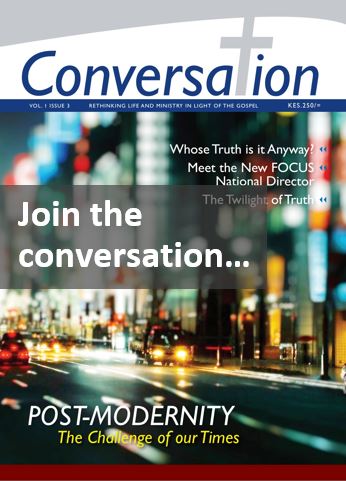
It was lovely to send a few days away together at the iServe Re:Fresh Retreat recently. But why rest? Isn’t it a luxury? Isn’t rest for wimps? Can’t we rest when we’re in the ground?
It’s a big issue in our context. Kenyans have a well-deserved reputation of being extremely hardworking. It is very common to get up two hours before light, have a long commute, long hours, evening or weekend classes, an additional part-time job, heavy family responsibilities, Saturdays working, Sundays packed with church, social and financial groups, little if any holiday, two mobile phones constantly ringing, email like an ever-flowing stream, multi-tasking, never stopping, squeezing events into the day as if time is elastic.
Not resting has some serious consequences though. Physically you start getting more colds and flus. Eventually you burnout. It’s not uncommon to hear of brothers who have collapsed through exhaustion. Mentally it becomes increasingly hard to concentrate and make good decisions. Productivity goes down. Emotionally, tiredness often breeds grumpiness and irritability. It becomes very hard to maintain godly gracious relationships. And in terms of spiritual disciplines, the more tired we get, the harder it gets to read the Bible and pray.
What does Jesus say?
“Come to me, all you who are weary and burdened, and I will give you rest. Take my yoke upon you and learn from me, for I am gentle and humble in heart, and you will find rest for your souls. For my yoke is easy and my burden is light.”
Twice Jesus promises rest. Rest. Sabbath. This is one of the very peaks of the Bible. The world had waited thousands of years to hear that word from the lips of its creator. Right at the beginning there had been that rest (Gen. 2:1-3), “God’s rest” (Heb. 4:3-10), rest in an intimate relationship with the Father and the Son. Sure there was ‘work’ in the garden (Gen. 2:15) but it would have been so far from what we normally think of as work as to be almost unrecognisable to us – no sweat, no stress, no sin to overcome, no tears, no toil, no frustration, no exhaustion. Easy work. Restful work! In fact the word for ‘work’ there is a priestly word usually used for service in the tabernacle. Adam was the first high priest in the first tabernacle and with no sacrifices needed presumably his service was simply praising God and enjoying the presence of God (and naming animals!).
Then of course there’s the fall from grace and exile from the Sabbath. Man is burdened with the heavy yoke of curse and condemnation and death and decay and toil and pain and sin. Throughout the Old Testament Sabbath is a hugely important theme. In the Law and the Prophets the whole issue of keeping the Sabbath is massively important. In fact the huge emphasis and the harsh penalties for disregarding it seem bizarre until you recognise the Sabbath as a) a reminder of everything they’ve lost (Ex. 31:17); b) a foretaste of the great coming rest (Heb. 4:9); c) an engagement ring given by God gave to his people (Ezek. 20:12). In the historical books of the OT we look on as it seems that Israel might find ‘rest’ in the Promised Land, it looks good with Joshua, we see the high point of Solomon, finally given rest on every side but at the same time we hear from Psalm 95 and the book of Ecclesiastes that the rest has not yet been entered and the burden is still lying very heavy, even on the king himself.

Then finally, finally, along comes a man, a king, who says that he will give us rest. Real rest. Sabbath.
But what does that actually mean? What does it look like? How can this help us practically with issues of work-life balance? I think there’s probably a present and a future aspect to this rest.
Present rest
The most important thing to notice about this rest is that it is all centred on Jesus. Rest is found in coming to him and being yoked to him. And because he is the one who intimately knows and is known by the Father (Matt. 11:27), to be yoked to Jesus is to be brought to the Father, to be brought back into the original intimate Sabbath relationship with God.
And it’s not by works. It’s for little children (Matt. 11:25). It’s a rest from our works (Heb. 4:10). No longer the heavy yoke of the Law (Acts 15:10) and the burdens of the Pharisees (Matt. 23:4). The easy yoke. Union with Christ. Sharing in his righteousness and joy and sufferings and glory.
And what happened to all the death and curse and heavy burden? Well there’s an omen in the surrounding verses – Matt. 11:18-24 and Matt. 12 are all about the rejection of the Son. The one who offers only life and rest to man is, perversely, going to be rejected. And paradoxically, at the very moment of his rejection, he will be taking all our burden, drinking all our curse, taking all our condemnation.
And we have that rest right now. Sasa hivi. We are yoked to Christ, justified by faith, children of God, no condemnation in Christ Jesus. And that helps us in very practical ways:
- I’m justified in Christ so I don’t need to prove myself. Research indicates (source: Interhealth) that the number one reason why millions of us don’t rest enough, don’t take holiday we are entitled to, don’t leave work on time, is that we are, on some level, seeking to justify ourselves. Maybe it’s our boss we’re trying to prove ourselves to, maybe our colleagues or employees, maybe our parents, maybe God, maybe ourselves. We instinctively link our status and significance to achievement and performance. For many people it has become a source of pride to have a crammed diary, to have the phone constantly ringing, to be able to say, “I’m really really busy at the moment”. Conversely, not to be busy is not be significant. I fear what people will think if they find me resting. I even fear what I will think of myself if I’m resting. The only way to attack this fear is to preach rest in Christ to ourselves. He has done it all. He has clothed me in his righteousness. It doesn’t really matter what anyone thinks of me, it doesn’t even matter what I think of me, the truth is I am the Father’s child and he loves me to bits. You might feel insecure about resting. You are secure in Christ. You might feel guilty about resting (or be made to feel guilty about resting) but the reality is you are not guilty, you’ve got nothing to prove.
- I’m not Christ so I don’t need to try to save everyone. Another reason for overwork and under-rest, perhaps a common one in our context among lovely godly servant hearted believers, is the desire to address everyone else’s problems, to meet every need in the extended family, to stand in the gap for every needy causes, and to hear the church adding to this the urgent call to transform our communities, change the world, save the planet. In many ways it’s a really good desire and I’ve been challenged so many times by the labour of love of many brothers and sisters in Christ whose desire to pour themselves out for others and take on extra jobs simply to be able to give it all away is a rebuke to me. And yet… it can tip over into an attempt to be Christ to people, a Messiah complex, a need to be needed, an attempt to be everyone’s saviour. It’s a very liberating truth to know that Jesus is the saviour of the world not us. He is the one who says come to ME and I will give you rest. We are to bear one another’s burdens (Gal. 6:2) but we cannot bear everyone’s burdens and we certainly can’t bear their most significant burdens of curse and death. We are not going to save the world. Often the most loving thing we can do is to say, like John the Baptist, “I am not the Christ; I can’t sort out all your issues; but if you go to Him you will find real rest in Him”.
Future rest
We enter into the Rest now in the sense of union with Christ, justification and relationship with God, but the fullness of Sabbath is still to come. The burden of the penalty of sin and the condemnation of the Law has been wonderfully lifted off us, but the burden of our physical decay, our sinful nature, the frustration and futility of the whole Creation still remains. We have to wait until death (Rev. 6:11; 14:13) or, more importantly, the return of Christ for the real fulfilment of the Genesis 2 Sabbath Land in the New Creation where, like Adam in the garden, we will be with the Lord and joyfully serve him in praise and delight without curse or sin or pain or burden (Rev. 21-22). On that Day Jesus “will give you rest.”
How does that make a practical difference?
- We are not yet in the Perfect Rest so I need to physically rest now. Because we are still under the burden of the Fall to a large extent, in weak, perishable bodies, daily facing sin and frustration within and without, we do still need to make time to stop and rest or we will burn out and fail to go the distance in the marathon of gospel ministry. There is a super-spiritual attitude which says that as a born again Spirit-filled believer I can work every hour and go without sleep and go without food and it won’t affect me at all because the Lord will sustain me. But that is over-realised eschatology. In the New Eden there will be restful, joyful work but for now it is still hard toil. In the New Creation there will be endless day but for now there is still day and night and sleep as a reminder of our mortality. One day we will have glorious resurrection bodies but for now we need to accept our weak, groaning creaturely-ness and sleep 8 hours and take at least a day off a week and eat healthily and not flog our bodies into an unnecessarily early grave.
- We are not yet in the Perfect Rest so I need to keep an eternal perspective. We’ve been thinking a lot at iServe recently about the danger of a lack of eternal perspective, the lack of teaching on the return of Christ, the Now-focus of much of our preaching. Everything in us and in the world is pulling our eyes down to the here-and-now. And so our hearts end up desiring simply the things of this world, our gospel is neutered and we lack the great Hope which is supposed to sustain us in our pilgrimage. It needs great discipline to fix our eyes on Christ’s coming, a future beyond this world in the perfect Sabbath. And that (as we mentioned above) was part of the point of the Sabbath day in the Old Testament – a time for the people to stop and fix their eyes on the Lord and his coming and long for Eden and an eternal Sabbath. It’s not Law for us as NT believers to take a Sabbath every week in the same way it was for the OT people of God but I don’t see why we wouldn’t need the same discipline of taking at least a day every week to disengage from the world and consciously fix our eyes on our coming Lord and the glorious prospect of Rest with him.
(Some practical stuff of work-life balance from Interhealth here.)
Read Full Post »
















